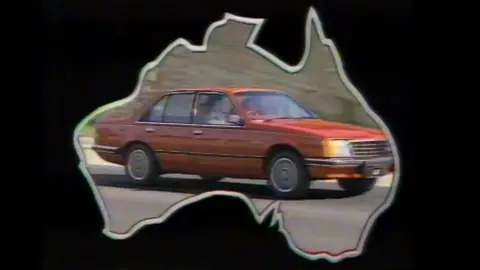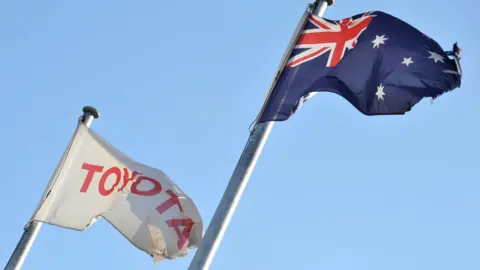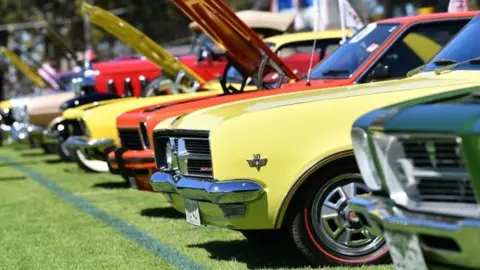Australian carmaking runs out of road
 Holden
HoldenAustralia's final locally made car left the production line on Friday when Holden stopped manufacturing in the nation. It is considered the end of an era after similar exits by Ford and Toyota, writes the BBC's Hywel Griffith in Sydney.
"We love football, meat pies, kangaroos and Holden cars."
The chorus to Holden's 1970s TV advert tells you everything you need to know about the company that gave Australia its first homegrown, mass-produced motorcar.
Or almost everything - since 1931, this all-Aussie brand has in fact been owned by the American giant General Motors.
It is Holden's position in the global market that is key to understanding the rise and fall of car manufacturing in Australia.
Holden started off as an Adelaide saddle-maker before adapting to the arrival of motorbikes and cars by supplying upholstery and vehicle bodies.
Following World War Two, it got the backing of the Australian government, which wanted to kickstart domestic car manufacturing and give the nation some global status.
The birth of the first Holden 48-215 in 1948 began the public's love affair with "Australia's own car", which would blossom over the decades.
 Getty Images
Getty Images"It's what we grew up with, it's just what we know," explains Jason Fischer from Gosford Classic Car Museum, as he shows me their collection of vintage Holdens, from one of the first 48-215s to a classic Aussie ute.
"I came home from hospital in a Holden car, my dad had one, my grandfather had one and so on, so you know - it's just a natural progression."
While there were other cars on the market, Holden could lay claim to producing the first vehicle made by Australians, for Australians.
"They were rugged, they could deal with our temperatures," Mr Fischer says. "Outback Australia is a pretty harsh place and these things were made tough."
Tribal loyalty
Through the 1960s and '70s, Holden was king of the road in Australia, with the only serious competition coming from Ford, who launched their own Australian-made family car, the Falcon.
Toyota also started production in Australia in 1963, but it was Holden and Ford who built almost tribal loyalty among their customers, which culminated each year in the companies going head-to-head in the Bathurst 1000 motor race.
These were the sunshine years - the time of that technicolor TV advert for meat pies and kangaroos that showed Holden cars being driven by happy, smiling, patriotic Australians.
As more families could afford a car, Holden expanded and introduced its popular new model, the Commodore.
Until the late 1980s, steep import tariffs kept Australian-made cars ahead of the pack, as foreign-built vehicles from the rest of the world remained largely unaffordable.
 Getty Images
Getty ImagesBut that same protectionist policy may have created complacency, according to Prof Roy Green, the dean of UTS Business School in Sydney.
"In a sense, the Australian local assembly industry was destined to fail because it was established originally behind very high tariff barriers," he argues.
"It couldn't become export competitive when the tariffs were reduced. This is when imports started to flood in and the local industry was very slow to adapt, very slow to take on new ideas and methods."
As those tariffs started to fall, global competition increased - but Holden's decline wasn't instant.
The company's Commodore model continued to figure prominently among Australia's best-selling cars well into the 21st Century.
Holden was also an important exporter, shipping cars to the Middle East and Brazil, and contributing significantly to Australia's balance of trade.
'Loss for Australia'
But by 2013, with decades of government subsidies drying up, the writing was on the wall and Holden announced it could no longer afford to manufacture cars in Australia.
With Ford and Toyota already having ceased production in Australia, Holden said its vehicles would also be built abroad.
The decision means the deep loyalty many customers have felt will be tested.
 EPA
EPAAt the Australian Car Sales garage in western Sydney, we found one worker with a Holden tattoo on his arm.
But manager Shayne Hennessey is concerned about how people will respond.
"I think it's going to be a huge loss for Australia," he says. "I don't think the public are going to take lightly to this, they might go to a different brand."
At the moment around 70% of customers at his used car yard are looking for a Holden Commodore, and he anticipates there will at least be an initial spike in sales for the last Australian-made Holden cars.
"The only thing it's going to be now is a historic car," he says. "[For] people who can afford to put it away in the garage, it might be worth a fair bit of money in years to come."
With the rapid growth in electric vehicles threatening to disrupt the market, there is at least some hope Australia could one day produce its own cars again.
But for now, the story of "Australia's own car" seems to be at the end of the road.
